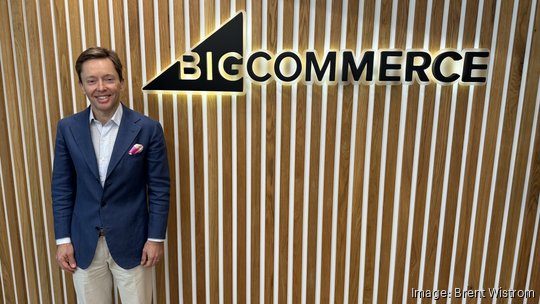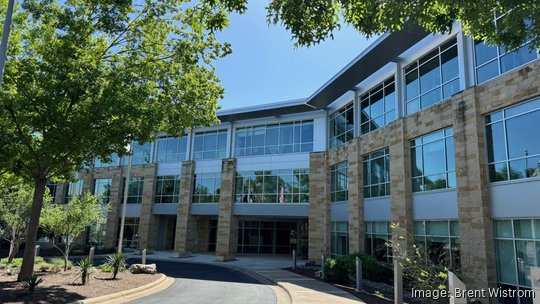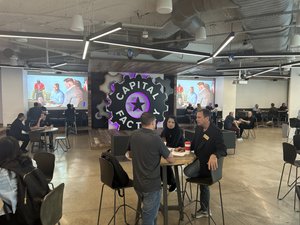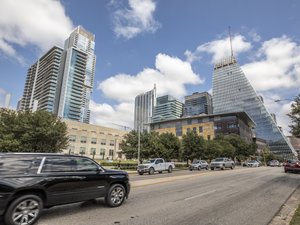
BigCommerce Holdings Inc. faces fierce competition from its much bigger competitor, Canadian e-commerce giant Shopify Inc. But don't think BigCommerce isn't taking big swings.
After a rocky couple of years that included two rounds of layoffs and plenty of fits and starts in the broader e-commerce landscape, BigCommerce CEO Brent Bellm said the Austin-based company became profitable late last year and has turned a corner.
"We exited the year for the first time really demonstrating that the transition to be profitable was complete," he said. "And that tees us up now nicely for 2024, where with a profitable foundation, the key theme is accelerating our growth rate back, but now in a way that it's profitable growth. And that's really where the focus is."
While there's no doubt Shopify is the market leader, BigCommerce is often mentioned as the next most important e-commerce platform. And Bellm doesn't hesitate to point out where he thinks his company has an edge over its Canadian rival.
"I'm proud that America is fighting and innovating," he said. "And, just frankly, we're leading them in terms of our product capabilities in select parts of the market. I mean, they're much bigger than we are. But when it comes to B2B; when it comes to enterprise and B2C; when it comes to omnichannel [and] international or cross border capabilities, we're ahead of them."
BigCommerce was originally an Australian company founded in 2004 as Interspire Pty. Ltd. It became BigCommerce in 2009 and opened its Austin office, later moving its headquarters here in 2011. After raising nearly $225 million in venture backing from firms including General Catalyst and Goldman Sachs, the company (Nasdaq: BIGC) went public in 2020.

Bellm said one of the company's most important moves in recent years was acquiring data feed management platform Feedonomics in 2021 for about $145 million. That has helped the company more quickly and easily integrate data into AI-powered systems that help its clients rank higher on Google searches by properly indexing a wide variety of product features, such as size, color and material to match Google's schema, which is mimicked by many other platforms.
"If you start with Google, and the AI takes you from terrible performance of 60% to great performance at 100% match, and a 20% lift in sales, now all that work that the AI did for Google, you use that as the foundation to go to all the other ad channels. And now they perform, and they get the 20% lift. You think about that — a 20% lift in sales through all the ad channels you're using Feedonomics for — it's brilliant."
But that addition alone didn't bring BigCommerce to profitability.
In 2022, it cut its workforce by about 13% as it sought to trim costs and reach profitability. And, again in November, it laid off an additional 7% of its staff.
BigCommerce now has about 1,300 employees globally, about a third of whom are based in the Austin area. It plans to hire more people but at a relatively cautious pace.
"Our total headcount is down relative to two years ago but not radically. So it's mostly flat," Bellm said. "Meanwhile, revenue has been growing. So that's a way you get to profitability ... I would say we're right size, meaning we can grow headcount going forward, not at the rate of revenue. We're going to want to keep getting some bottom-line profit leverage, but at least at half the rate of revenue growth."
Meanwhile, the company, which largely went remote during the pandemic like many other tech companies, has instituted a one-day-per-week office policy. With that, the company is subleasing two floors of its headquarters building near Ranch-to-Market Road 2222 and Farm-to-Market Road 620. The company's local staff works out of the 30,142-square-feet area on the first floor.
"At one point, we had two and a half floors of it. We don't need all those floors now, because even for our workers, it's not like all 450 are coming in the office every day," Bellm said.
With a smaller staff and market cap, Bellm said BigCommerce has to pick the spots where it thinks it can outperform competitors, such as Shopify.
"We've made the conscious choice that we're going to be the leader in enterprise capabilities, we're going to be the leader in B2B, we're going to be a leader in omnichannel," he said. "If you're a startup that just wants simplicity, and everything handled for you, even if you have to pay more for it with the highest ease of use, Shopify is the market leader for that type of customer."
The competitive nature could help other businesses as they pick which platforms to build their e-commerce sites on.
For example, BigCommerce recently rolled out about 100 additional features to its platform to help it reach those goals. That includes composable solutions that give companies more flexibility to implement third-party components to their websites. It also launched its new BigAI Copywriter that uses generative AI to help craft SEO optimized product descriptions and new design toolkits.
"The customer always benefits in every industry from competition in business," he said. "And when you have a world-class competitor like we do, that means we have to be world class."
BigCommerce ranked No. 37 on the Austin Business Journal's latest list of tech employers, and it's the 29th largest public company headquartered in Austin, according to additional list research.
Shares traded at $5.96 midday April 17, down 34% so far this year. Shopify (NYSE: SHOP) shares traded at $70 each, down 5% year-to-date.







